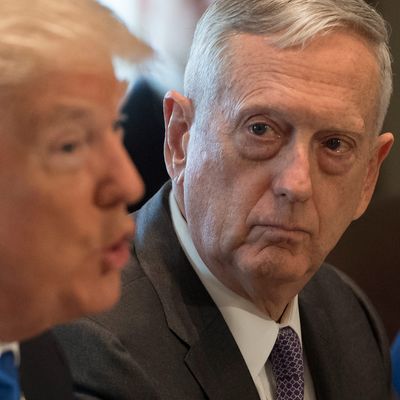
Just before he flew too close to the sun, lost his wings, and plummeted back down into the murky depths of the far-right fever swamp, Steve Bannon said something so politically incorrect, it made the Trump administration blush: that there was no “military solution” to North Korea’s nuclear program.
“Until somebody solves the part of the equation that shows me that 10 million people in Seoul don’t die in the first 30 minutes from conventional weapons,” Bannon told The American Prospect, “I don’t know what you’re talking about.”
The administration publicly rejected this analysis, and proceeded to expedite Bannon’s eviction from the West Wing. But according to a new report from the New York Times, in private, our government’s top military advisers see the same unsolvable equation — and are worried that the remaining civilian leadership lacks the sobriety and humility of that not-so-dearly departed “nationalist-Leninist” blogger:
The White House has grown frustrated in recent weeks by what it considers the Pentagon’s reluctance to provide President Trump with options for a military strike against North Korea, according to officials, the latest sign of a deepening split in the administration over how to confront the nuclear-armed regime of Kim Jong-un.
The national security adviser, Lt. Gen. H. R. McMaster, believes that for Mr. Trump’s warnings to North Korea to be credible, the United States must have well-developed military plans, according to those officials.
But the Pentagon, they say, is worried that the White House is moving too hastily toward military action on the Korean Peninsula that could escalate catastrophically. Giving the president too many options, the officials said, could increase the odds that he will act.
The optimistic reading of the Times story is this: None of the president’s top advisers believe that preemptive military action against North Korea is advisable, but McMaster wants to put together the strongest possible bluff. Pentagon officials, however, are concerned that the president could actually green-light whatever horrendously ill-advised, hypothetical battle plan they put in front of him. In this reading, the dynamic is broadly similar to the one portrayed in Mitchell and Webb’s “Kill All the Poor” sketch.
The pessimistic reading is that McMaster genuinely believes what he’s said about the North Korean regime: that it is an irrational actor that can’t deterred by the logic of mutually assured destruction. This view, for which there is scant evidence, would ostensibly make a mass-casualty, preemptive war look justifiable — if that were truly the only way to prevent Kim Jong-un from holding a nuclear arsenal that could reliably hit major American cities.
The Times report suggests that Defense Secretary James Mattis, Secretary of State Rex Tillerson, and Chairman of the Joint Chiefs of Staff Joseph F. Dunford Jr. all fear that the pessimistic scenario is closer to reality:
When North Korea tested an intercontinental ballistic missile in July that experts concluded was capable of reaching the West Coast of the United States, the National Security Council convened a conference call that included Secretary of Defense Jim Mattis and Secretary of State Rex W. Tillerson.
After General McMaster left the room, Mr. Mattis and Mr. Tillerson continued to speak, not realizing that other participants were still on the line. The officials familiar with the matter overheard them complaining about a series of meetings that the National Security Council had set up to consider options for North Korea — signs, Mr. Tillerson said, that it was becoming overly aggressive.
…While General McMaster also favors a diplomatic solution to the impasse, officials said, he emphasizes to colleagues that past efforts to negotiate with North Korea have forced the United States to make unacceptable concessions.
The Pentagon has a different view. Mr. Mattis and the chairman of the Joint Chiefs of Staff, Gen. Joseph F. Dunford Jr., argue forcefully for using diplomacy. They have repeatedly warned, in meetings and on video conference calls, that there are few, if any, military options that would not provoke retaliation from North Korea, according to officials at the Defense Department.
Such internal tensions have been visible at multiple points in recent weeks. Back in December, Tillerson suggested that the White House was ready to talk with Kim’s regime “without precondition” — an offer that the White House promptly disavowed, and that Tillerson was forced to walk back.
Around the same time, tensions were (reportedly) building between Trump’s tentative nominee for ambassador to South Korea, Victor Cha, and the more trigger-happy members of his NSC. A former director of Asia policy in the George W. Bush administration, Cha is widely respected in Seoul, and is regarded as a “hawk” on foreign-policy questions in Washington. In December, the White House formally notified the South Korean government that Trump would ask the Senate to confirm Cha to the ambassadorship.
And then, earlier this week, we learned that Cha is no longer under consideration for that position. The cause of the split, according to several sources who spoke with the Washington Post, was Cha’s relentless opposition to the idea of a “bloody nose” strike (a “limited” attack, aimed at strengthening America’s position in talks) against Pyongyang. The would-be ambassador explained that such a gambit was strategically incoherent and could very well get tens of thousands of people killed. Some in the White House reportedly found this analysis off-putting — and so, Cha’s appointment was called off.






























